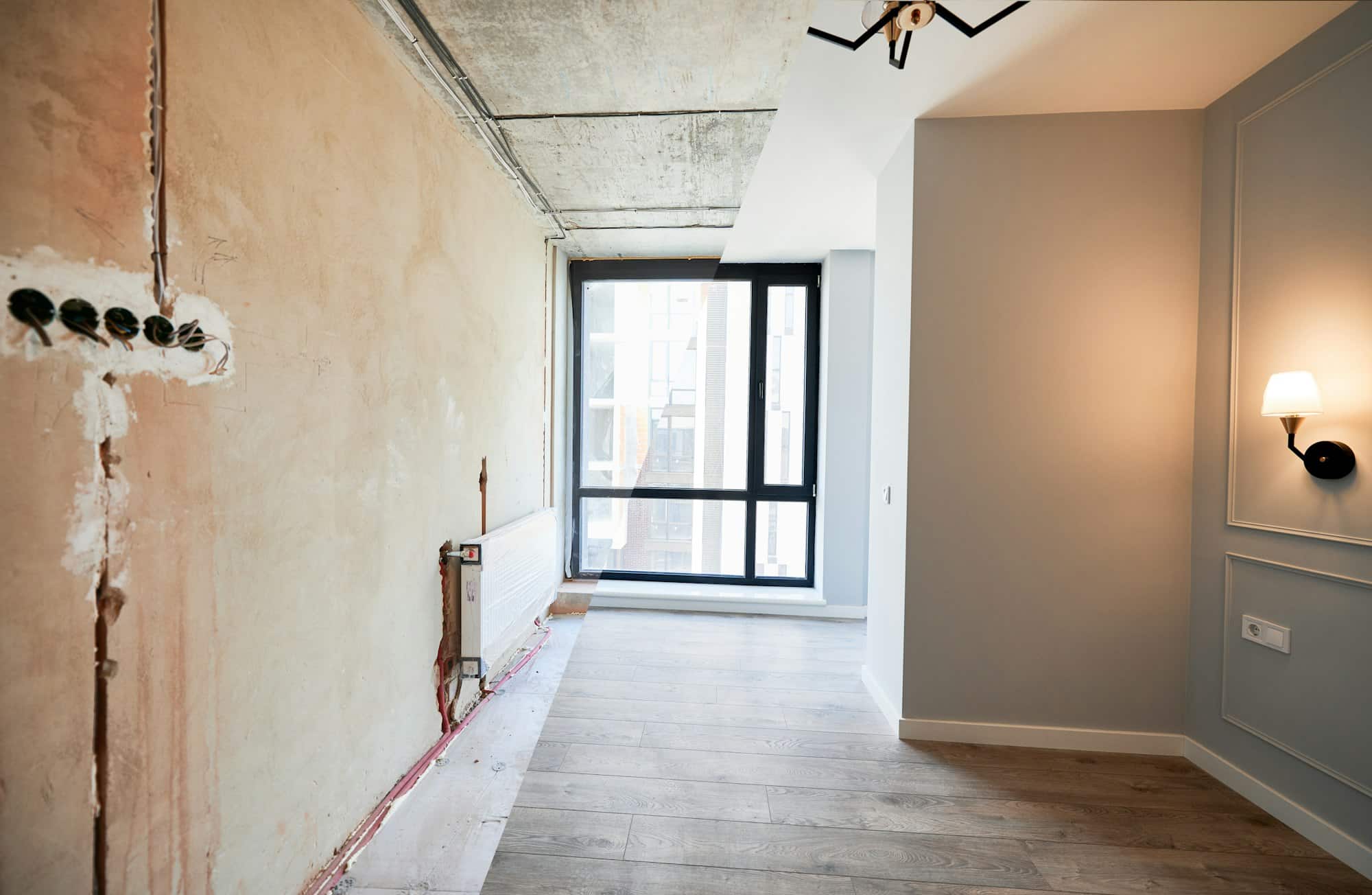Preparing for a home renovation? Before diving in, familiarize yourself with key industry terms and concepts. Our glossary offers clear explanations that will guide you through every step of your renovation journey, ensuring you feel confident and informed throughout the process.
If you’re looking for more terms or have specific questions, feel free to reach out to us at contact We’re here to help!
Glossary – A
| Term | Definition |
|---|---|
| 110 Line | A ‘110’ volt is a standard voltage household circuit that can support most appliances, lighting, and more. |
| AC | AC stands for air conditioning, a system for controlling humidity, ventilation, and temperature to maintain a cool atmosphere. |
| AC Condenser | The AC condenser is located outside your home and uses a fan to remove heat from the refrigerant gas and turn it back into a liquid. |
| ADA | ADA stands for Americans with Disabilities Act, which provides accessibility guidelines for building design. |
| Addition | An addition includes new rooms or square footage that is added to a home. |
| ADU | ADU stands for accessory dwelling unit, also known as a mother-in-law apartment. |
| Aggregate | Aggregate is made up of sand, gravel, or crushed rock and is used to create a strong foundation by being mixed into concrete. |
| Allowances | Allowances refer to part of the construction budget reserved for items that still need to be selected. |
| Apprentice | An apprentice is a construction professional, such as a plumber or electrician in training. |
| Apron | An apron is the vertical trim board under a window. |
| Architect | Architects are licensed professionals who design buildings, both residential and commercial. |
| Area Wells | Area wells are metal or concrete structures that hold back earth to make space for basement windows. |
| Asbestos | Asbestos is a mineral material that was used for fireproofing but was later found to be a dangerous carcinogen. |
| Awning Window | An awning window is a window that hinges at the top and is usually operated with a crank. |
Glossary – B
| Term | Definition |
|---|---|
| Backfilling | Backfilling involves filling holes or exposed areas that occur during construction with dirt. |
| Backsplash | A waterproof surface installed behind a kitchen countertop that is easy to clean, such as tile. |
| Baseboard | The baseboard is a trim board around a room that connects between the wall and the floor. |
| Basement Finishing | Increasing living space by insulating and adding finished flooring and drywall to your basement. |
| Beams | Wooden or steel structures used as replacements when a wall is removed to support the weight of a home. |
| Bid | A legally binding contract that lays out specific work that a contractor must fulfill as part of a construction project. |
| Boom | A crane truck for transporting heavy construction items and elevating them to the right floor level. |
| Building Codes | Stipulations that state how a home must be constructed; these rules may be standardized or city-specific. |
| Building Permit | An authorization issued by your local government, city, or municipality approving a construction project. |
| Bungalow | A one-story small house or cottage usually accompanied by large front porches and verandas. |
| Built Environment | The space people have created for living, working, and leisure activities. |
Glossary – C
| Term | Definition |
|---|---|
| Cabinet Refacing | A more cost-friendly alternative to cabinet replacement where existing cabinets are repainted or have a veneer applied to them. |
| CAD | Computer-aided design (CAD) is a design created using software, allowing plans to be made in 3D. |
| Carpeting | A floor covering made of thick woven fabric, such as nylon, polyester, or natural wool. |
| Caulk | Caulk is used to fill gaps; it is a flexible material that stretches before hardening during the drying process. |
| Carpenter | An individual who possesses wood craftsmanship. |
| Ceiling Joist | Resting on load-bearing walls, ceiling joists are parallel framing structures that support ceiling loads. |
| Cement | Cement is the adhesive element of concrete. |
| Ceramic Tile | A fired or glazed clay tile used for flooring, showers, and walls. |
| Certificate of Occupancy | A municipality-issued document certifying that a building is in compliance with building codes and can be lived in. |
| Change Order | Modifications made to a project during construction or alterations to the terms of the renovation contract. |
| Column | A concrete or steel vertical structure that supports the weight of the building. |
| Concrete | Used for foundations, slabs, and structural columns, concrete is a material made of sand, gravel, Portland cement, and water. |
| Construction Contract | A legal document detailing the scope of work, subcontractors, project pricing, and any additional terms agreed upon with the property owner. |
| Consultant | A professional providing expert advice in a particular field, such as an architect or interior designer in remodeling projects. |
| Contractor | A professional who oversees most aspects of a construction project and hires subcontractors for specialized work. |
| Cosmetic Upgrade | Remodeling projects where paint and other surfaces are refreshed without changing the layout of a room. |
Glossary – D
| Term | Definition |
|---|---|
| DADU | A Detached Accessory Dwelling Unit (DADU) is a small home constructed on the same lot as a single-family home. |
| Demo | Demo stands for demolition, which involves removing existing fixtures, walls, or structures to prepare a space for renovation. |
| Design Build | A design-build approach combines design and construction functions under one company, responsible for the project’s success. |
| Design Review | During a design review, local authorities verify building plans to ensure compliance with building codes for permit issuance. |
| Draw | Progress billings that a contractor makes at each stage of a project for work completed. |
| Drywall | Gypsum plaster panels used to create ceiling and wall surfaces in homes. |
| Ducting | Light metal tubes that are part of the HVAC system and help move conditioned air around the house. |
Glossary – E
| Term | Definition |
|---|---|
| Egress Window | Large windows that can double as emergency exits and meet specific building code requirements. |
| Electrician | A construction professional specialized in the installation and repair of electrical equipment. |
| Estimate | A document that includes the estimated cost of materials, equipment, job scope, and transportation for a project. |
| Existing Conditions | The original layout of a home, as shown in building plans, to distinguish from proposed renovations. |
Glossary – F
| Term | Definition |
|---|---|
| Field Measurements | Measurements taken directly from the physical home, as opposed to those obtained from blueprints. |
| Finish Carpentry | The finishing touches after the main structural work is complete, including trim, doors, cabinets, stairs, and flooring installation. |
| Fixed Fee | Fixed costs agreed upon with your contractor that do not change regardless of the quantity of goods or services produced. |
| Fixture | In real estate, a fixture is any object permanently attached to a property using bolts, nails, cement, or other methods. |
| Floor Plan | A visual representation of a home’s interior, showing elements like walls, doors, windows, stairs, and appliances. |
| Foundation | The concrete structure below the first floor of a home, providing support for the building. |
| Foyer | An entry hall or area in a home. |
| Framing | Lumber used to construct the skeleton of the building, such as joists, studs, and rafters. |
| French Drain | A perforated drain pipe covered by gravel, located outside the perimeter of a home to keep the basement dry. |
| Full Review | Verification of proposed building plans to ensure they meet all zoning, safety, and building codes for large construction projects. |
Glossary – G
| Term | Definition |
|---|---|
| General Contractor | A general contractor oversees most aspects of a construction project, hiring subcontractors for specialized work like plumbing or electrical tasks. |
| Grade | The level of the ground around a building; for example, a basement is usually considered below grade. |
| Green Building | A building designed to reduce or eliminate negative impacts on the environment through sustainable practices. |
| Grout | A filler material used to fill the spaces between tiles. |
| Gutting a Home | The process of completely remodeling a home, often involving the removal of windows, doors, plumbing, and more. |
Glossary – H
| Term | Definition |
|---|---|
| Handyman | A person who performs small home repairs and improvements, often a sole proprietor, and may or may not be a licensed general contractor. |
| Hardscaping | Landscaping elements made of stone, concrete, tile, or brick, such as paths, walkways, and driveways. |
| Hardwood | Wood that comes from broad-leafed trees like oak, ash, or maple, as opposed to softwood, which comes from coniferous trees. |
| Header | A beam that spans the opening for a window, door, or stairway, providing support. |
| Heat Pump | A device that transfers heat from the outside air into your home, which is more energy-efficient than standard electric heat. |
| Heating Load | The amount of heat energy needed to maintain a desired indoor temperature, used to determine the size of a furnace required. |
| Hip Roof | A roof with four inclined sides, as opposed to two, providing greater wind resistance and a more stable structure. |
| HVAC | Abbreviation for heating, ventilation, and air conditioning systems that control the climate inside a building. |
| Insulation | Material used to reduce heat transfer and protect against sound and moisture, commonly installed in walls, attics, and floors. |
Glossary – I
| Term | Definition |
|---|---|
| I-Beam | A strong steel beam used to carry the weight of the roof and upper floors across long spans, typically seen in basements or large rooms. |
| Infiltration | The process by which air slips through the cracks and crevices of a home, causing drafts and wasting energy. |
| Induction Stove | A type of electric stove that heats the pan using magnetic fields, offering an efficient and quick heating method. |
| Inspections | Inspections are carried out by building inspectors to ensure that construction is up to code; this includes plumbing, electrical, and structural work. |
| Interior Decorator | A professional who selects furnishings, finishes, and decor to create a desired aesthetic in a home or building. |
| Interior Designer | A professional who plans and designs interior spaces, ensuring both aesthetic appeal and functional use, while addressing occupant safety. |
Glossary – J
| Term | Definition |
|---|---|
| Jack Post | An adjustable metal post used as a replacement for an old supporting post, typically in basements to prop up sagging floors. |
| Jack-and-Jill Bathroom | A bathroom with two entrances, one from each of two adjacent rooms, commonly used between children’s bedrooms. |
| Jamb | The vertical wood pieces that form the sides of a door or window frame. |
| Jib Door | A door designed to blend seamlessly into a wall or wainscoting, creating a hidden-room effect. |
| Job Site | The area where construction work is being carried out. |
| Joist | Horizontal planks of lumber that support floors or ceilings, usually resting on bearing walls or beams. |
| Joist Hanger | A U-shaped metal bracket used to support the ends of floor joists, typically attached to a beam. |
Glossary – K
| Term | Definition |
|---|---|
| Kilowatt Hour | A unit of measurement for electricity, equivalent to 1,000 watts used for one hour, commonly seen on household electrical meters. |
| Knob-and-Tube Wiring | An outdated method of wiring homes, popular in the U.S. from 1880 to 1940, using single-insulated wire supported by knobs. |
Glossary – L
| Term | Definition |
|---|---|
| Landscaping | The process of designing and arranging outdoor spaces with plants, structures, and other features to enhance aesthetics and functionality. |
| Leach Field | An area of land where waste from a septic system is gradually released into the soil, typically in rural areas without access to city sewers. |
| Lineal Foot | A method of measuring lumber, where each lineal foot is a measurement of one foot in length. |
| Load-Bearing Wall | A wall that supports the weight of the structure above it, essential for the stability of the building. |
| LOI | LOI stands for Letter of Intent, a document that outlines the preliminary agreement between a builder/designer and a homeowner. |
| Lot | A plot of land on which a home is located. |
| Louver | A cover for an exterior vent with angled slats that allow air to flow while keeping out water and debris. |
| Lumens | A unit of measurement for the amount of light emitted by a source, such as a light bulb. |
| LVT | Luxury Vinyl Tile (LVT) is a type of flooring material that mimics the appearance of wood or stone and is known for its durability and resistance to moisture. |
Glossary – M
| Term | Definition |
|---|---|
| Main Water Shutoff | A valve that controls the main water supply to the house, allowing plumbing work to be done safely. |
| Mansard Roof | A roof with two slopes on each side, with the lower slope being steeper than the upper slope, creating additional attic or living space. |
| Mantel | A decorative shelf above a fireplace, often used to display items or for aesthetic purposes. |
| Marble | A natural stone used for countertops, flooring, and other decorative surfaces, known for its beauty and durability. |
| Marmoleum | A brand of linoleum flooring made from natural materials, known for its sustainability and hypoallergenic properties. |
| Masonry | The construction of structures from individual units of brick, stone, or concrete, bound together with mortar. |
| Master Suite | The largest bedroom in a home, often featuring an attached bathroom and additional space for seating or a walk-in closet. |
| MDF | Medium-Density Fiberboard (MDF) is an engineered wood product made from wood fibers and resin, commonly used in furniture and trim. |
| Membrane | A thin layer of material used as a barrier to prevent water infiltration, commonly used on roofs and foundations. |
| Mid-Century Modern | A design style popular from the 1930s to the 1960s, characterized by clean lines, organic forms, and minimal ornamentation. |
| Millwork | Wood products such as trim, doors, and moldings produced in a mill, used in the construction and finishing of buildings. |
| Mini Split | A type of heating and cooling system that allows for individual control of the temperature in different rooms. |
| Miter Joint | A joint made by cutting two pieces of material at a 45-degree angle and joining them to form a 90-degree corner. |
| Molding | Decorative trim used to frame or accentuate architectural elements like doors, windows, and ceilings. |
| Mortar | A mixture of sand, water, and cement used to bond bricks, stones, or other masonry units together. |
| Mother-in-Law Apartment | An accessory dwelling unit (ADU) that is either attached or separate from the main living unit. |
| Mud Room | A small entryway where outerwear, shoes, and wet clothing can be removed before entering the main living area. |
| Mudding | The process of applying drywall compound (mud) to cover seams, joints, and screw holes in drywall, creating a smooth surface for painting. |
| Mullion | A vertical bar or post that divides a window into smaller panes of glass. |
Glossary – N
| Term | Definition |
|---|---|
| Natural Gas | A fossil fuel used for heating and cooking in homes, consisting primarily of methane. |
| Net-Zero-Energy | A building or home that produces as much energy as it consumes over the course of a year, typically through renewable energy sources like solar panels. |
| NKBA | The National Kitchen and Bath Association, a nonprofit trade association representing the kitchen and bath industry. |
| Nonbearing Wall | A wall that does not support any of the structural load of a building and can usually be removed or modified without affecting the integrity of the structure. |
Glossary – O
| Term | Definition |
|---|---|
| On-Demand Hot Water Heater | A tankless water heater that heats water only as it is needed, using high-powered burners fueled by electricity or gas. |
| OSB | Oriented Strand Board, an engineered wood product made by compressing layers of wood strands with adhesives, commonly used in construction. |
Glossary – P
| Term | Definition |
|---|---|
| P-Trap | A U-shaped pipe beneath sinks and other fixtures that holds water to prevent sewer gases from entering the home. |
| Paint | A liquid substance applied to surfaces that dries to form a decorative or protective coating. |
| Particle Board | An engineered wood product made from wood particles and adhesives, often used in furniture and cabinetry. |
| Partition | A wall or divider that separates or divides a space within a building. |
| Paver | A flat piece of stone, concrete, or brick used to create walkways, patios, or other outdoor surfaces. |
| Pedestal Sink | A type of bathroom sink supported by a column or pedestal, with no visible base cabinet. |
| Percolation Test | A test performed to determine the soil’s ability to absorb water, commonly used when installing a septic system. |
| Perimeter Drain | A drainage system installed around the perimeter of a building’s foundation to prevent water from seeping into the basement. |
| Permeable Pavement | A type of pavement that allows water to pass through it, reducing runoff and promoting groundwater recharge. |
| Permit | An official document issued by a government authority that allows construction or renovation work to be carried out. |
| PEX | Cross-linked polyethylene, a flexible plastic tubing used for water supply pipes and radiant floor heating systems. |
| Pitch | The steepness or slope of a roof, usually expressed as a ratio of vertical rise to horizontal run. |
| Plan View | A view in architectural plans that shows the layout of a building or space from above. |
| Plans | A set of technical drawings that detail the design, layout, and specifications of a building or renovation project. |
| Plumb | Perfectly vertical or perpendicular to the ground, used to describe walls, posts, or other structural elements. |
| Plumber | A professional who installs and repairs pipes, fixtures, and appliances related to water supply and drainage systems. |
| Plumbing Rough | The stage in construction when pipes and vents are installed but not yet connected to fixtures or appliances. |
| Plumbing Stack | A main vertical pipe that carries waste water and vent gases from all plumbing fixtures in a building. |
| Plywood | A type of engineered wood made from thin layers of veneer glued together, commonly used for flooring, walls, and roofing. |
| Pocket Door | A sliding door that disappears into a compartment in the adjacent wall when fully open. |
| Porcelain Tile | A type of ceramic tile made from finer, denser clay and fired at a higher temperature, making it more durable and water-resistant. |
| Portland Cement | A common type of cement used in concrete, mortar, and other construction applications. |
| Post and Beam | A construction method using large horizontal beams supported by vertical posts, often leaving the structure exposed as part of the design. |
| Post and Pier Foundation | A type of foundation that uses posts or piers to support the weight of a building, typically used in areas with unstable soil or in flood zones. |
| Primer | A preparatory coating applied to surfaces before painting, improving adhesion and durability of the final paint layer. |
| Punch List | A list of items that need to be completed or corrected before a construction project is considered finished. |
| PV | Photovoltaic, referring to solar panels that convert sunlight into electricity. |
| PVC | Polyvinyl chloride, a type of plastic commonly used for pipes and other construction materials. |
Glossary – Q
| Term | Definition |
|---|---|
| Quartz | A hard, crystalline mineral used in countertops and other surfaces, often engineered to be more durable and stain-resistant. |
| Quartzite | A natural stone similar to granite, used for countertops and other surfaces, known for its durability and unique patterns. |
Glossary – R
| Term | Definition |
|---|---|
| R-Value | A measure of how well an insulating material resists the flow of heat, with higher R-values indicating better insulation performance. |
| Radiant Heating | A type of heating system that uses hot water pipes or electric mats installed beneath the floor or in walls to radiate heat evenly throughout a room. |
| Rafter | A beam that extends from the ridge or hip of the roof to the wall plate, supporting the roof structure. |
| Rebar | Steel reinforcing bars embedded in concrete to provide additional strength and support to the structure. |
| Reclaimed Materials | Materials salvaged from old buildings or structures that are reused in new construction projects. |
| Reinforced Concrete | Concrete that has been strengthened with steel bars, mesh, or fibers to increase its tensile strength and durability. |
| Remediation | The process of cleaning up or mitigating environmental hazards, such as asbestos or lead paint, in a building. |
| Remodeling Contract | A legal agreement that outlines the scope, timeline, and costs of a renovation project between the homeowner and contractor. |
| Retaining Wall | A wall built to hold back soil or rock, typically used to prevent erosion or create level areas on sloped terrain. |
| Rim Joist | The outermost joist in a floor system, running perpendicular to the other joists and providing lateral support. |
| Risers | The vertical boards between each step of a staircase. |
| Romex | A brand name for a type of non-metallic sheathed electrical cable commonly used in residential wiring. |
| Rough Carpentry | The initial phase of carpentry work, including framing, roofing, and other structural tasks that do not require fine finishing. |
| Rough-In | The stage of construction when mechanical, electrical, and plumbing systems are installed but not yet connected to fixtures or appliances. |
| Rough Opening | The framed opening in a wall for a door or window before the installation of the final components like drywall and trim. |
Glossary – S
| Term | Definition |
|---|---|
| Sanitary Sewer | An underground sewer system that carries waste from homes and businesses to a sewage treatment plant. |
| Schematic Estimate | An initial cost estimate for a project, based on preliminary designs and specifications. |
| Second-Story Addition | Adding a second level to a single-story home by removing the roof and building upward. |
| Section Drawings | Architectural drawings that show a vertical cut-through of a building, revealing details of construction and design. |
| Semigloss Paint | Paint with a moderate sheen, often used in kitchens and bathrooms because it is easy to clean. |
| Setbacks | The required distance between a building and the property line or other structures, dictated by zoning laws. |
| Shaker Style | A furniture and cabinetry design style characterized by simple, clean lines and minimal ornamentation. |
| Sheathing | The layer of material, usually plywood or OSB, that covers the exterior of a building’s framing structure. |
| Sheet Metal Duct Work | Metal ducts that distribute heated or cooled air throughout a building as part of the HVAC system. |
| Shingles | Flat, rectangular pieces of asphalt, wood, or other material used to cover roofs and protect them from the elements. |
| Shower Pan | A waterproof insert installed in the floor of a shower to prevent leaks. |
| Siding | Material, such as vinyl or wood, used to cover the exterior of a building and protect it from the elements. |
| Single-Hung Window | A window with a fixed upper sash and a lower sash that slides vertically to open. |
| Skylight | A window installed in the roof of a building to provide natural light to the interior. |
| Soaking Tub | A deep bathtub designed for long, relaxing baths, often freestanding and more luxurious than standard tubs. |
| Solid-Surface Countertops | Countertops made from a synthetic material, often used as a durable and non-porous alternative to natural stone. |
| STFI Policy | Standard Fire and Allied Perils Insurance, a type of home insurance covering damage from fires, explosions, and other specific risks. |
| Storm Window | A second layer of glazing installed on the outside of existing windows to improve insulation and protect against harsh weather. |
| Stucco | A type of plaster used for coating exterior walls, providing a durable and weather-resistant finish. |
| Subcontractor | A person or company hired by the general contractor to perform specialized work on a construction project, such as plumbing or electrical work. |
Glossary – T
| Term | Definition |
|---|---|
| Take-Off | The process of calculating the quantities of materials needed for a construction project based on the plans and specifications. |
| Teardown | The demolition of an existing building to make way for new construction. |
| Tempered Glass | A type of safety glass that is strengthened through a heat treatment process, making it more resistant to impact and shattering into small, less harmful pieces. |
| Terrazzo | A flooring material made from marble, granite, or glass chips set in concrete or epoxy and polished to a smooth finish. |
| Time-and-Materials Contract | A type of construction contract where the client is billed for the actual cost of labor and materials, plus a markup for the contractor. |
| Trim | Decorative wood or molding used to finish the edges of walls, doors, windows, and other elements in a building. |
| Truss | A structural framework of beams arranged in triangular shapes, used to support roofs or bridges. |
| Two-Story Addition | Adding a second level to a one-story building, typically by removing the roof and building upward. |
| Treads | The horizontal part of a staircase that you step on. |
Glossary – U
| Term | Definition |
|---|---|
| U-Value | A measure of how much heat is lost through a window or wall; lower U-values indicate better insulation and energy efficiency. |
| Underlayment | A layer of material installed between the subfloor and the finished floor to provide a smooth surface and added insulation. |
| Universal Design | A design approach that makes spaces accessible and usable for people of all ages, abilities, and sizes. |
| Urethane Paint | A type of paint that contains urethane, giving it a glossy finish and added durability, often used on surfaces that require frequent cleaning or abrasion resistance. |
Glossary – V
| Term | Definition |
|---|---|
| Vanity | A bathroom fixture that combines a sink, countertop, and storage, typically with a mirror above. |
| Veneer | A thin layer of wood or other material applied to the surface of a cheaper material to give the appearance of higher quality. |
| Vessel | A type of sink that sits on top of the countertop, often used as a design feature in modern bathrooms. |
| Vinyl Windows | Windows made from polyvinyl chloride (PVC), known for their durability, low maintenance, and energy efficiency. |
Glossary – W
| Term | Definition |
|---|---|
| Walk-In Closet | A closet large enough to walk into, often used for storing clothes and other personal items. |
| Walk-In Shower | A shower that is level with the floor and does not require stepping over a threshold, often designed for accessibility and convenience. |
| Walk-Through | A final inspection of a construction project, where the contractor and client review the work to ensure it meets the agreed-upon specifications. |
| Wall-Hung Toilet | A toilet mounted on the wall with the tank hidden behind the wall, creating a sleek and modern look and saving space in the bathroom. |
| Warranty | A guarantee provided by a manufacturer or contractor that covers repairs or replacements for a specified period of time after the installation or purchase. |
| Water-Based Paint | A type of paint that uses water as a solvent, making it easy to clean and environmentally friendly, often used for interior walls. |
| Water Closet | A small room containing only a toilet, often located within or adjacent to a bathroom. |
| Water Main | The main pipe that supplies water from the municipal water system to a building. |
| Waterproofing | The process of applying materials or sealants to prevent water from penetrating a structure, often used in basements and foundations. |
| Weatherization | The process of making a building more energy-efficient by adding insulation, sealing leaks, and making other improvements to reduce energy consumption. |
| Weatherstrip | Strips of material applied to doors and windows to prevent drafts and improve energy efficiency by sealing gaps. |
| Wet Bathroom | A bathroom where the shower is not separated by a curtain or enclosure, allowing the entire room to get wet, often designed for ease of cleaning and accessibility. |
| Whole-House Fan | A ventilation system that draws cool air in from open windows and exhausts hot air out through the attic, helping to cool the entire house. |
Glossary – X
| Term | Definition |
|---|---|
| Xeriscaping | A landscaping method that reduces or eliminates the need for irrigation by using drought-resistant plants and efficient watering practices. |
| X-Bracing | A structural reinforcement technique where two supports are placed diagonally in an “X” shape to provide stability and distribute loads evenly. |
Glossary – Y
| Term | Definition |
|---|---|
| Yard | A unit of measurement equal to three feet, often used to measure length or distance in construction. |
| Yard of Cement | A cubic yard of concrete, commonly used as a measure for large quantities of concrete needed for construction projects. |
Glossary – Z
| Term | Definition |
|---|---|
| Zone | An area within a building that has its own independently controlled HVAC system, allowing for different temperature settings in different areas. |
| Zoning | Local regulations that determine how a property can be used, including restrictions on building height, density, and land use. |








